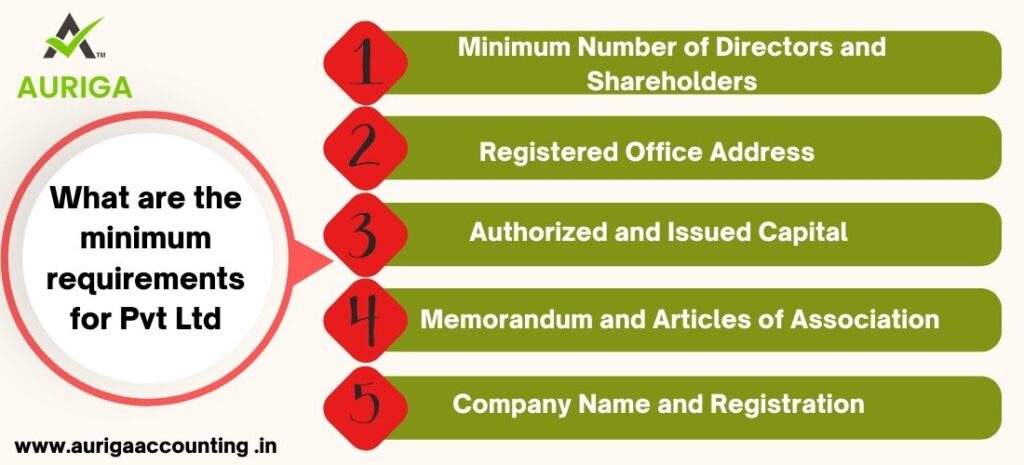
CAN I REGISTER PRIVATE LIMITED COMPANY BY SELF?
Introduction
ToggleCAN I REGISTER PRIVATE LIMITED COMPANY BY SELF?
Yes, you can register a Private Limited Company (Pvt Ltd Company) in India on your
own, without the assistance of a professional service provider. The process involves
several steps, and important to carefully follow the procedures outlined by the
Ministry of Corporate Affairs (MCA). Here a simplified guide for self-registration of a
Pvt Ltd Company: Visitofficialwebsite
1. Digital Signature Certificate (DSC):
Obtain a Digital Signature Certificate (DSC) for the proposed directors. This is
required for online filing with the MCA.
2. Director Identification Number (DIN):
Apply for Director Identification Number (DIN) for the proposed directors. DIN is a
unique identification number for directors.
3. Name Reservation:
Choose a unique name for your company and apply for name reservation
through the MCA. Ensure that the name complies with naming guidelines.
4. Memorandum of Association (MOA) and Articles of Association (AOA):
Draft the Memorandum of Association (MOA) and Articles of Association (AOA).
These documents define the company's objectives and rules.
5. Filing of Incorporation Documents:
File the incorporation documents, including the application for incorporation,
declaration of compliance, and other necessary forms with the MCA.
6. Payment of Incorporation Fees:
Pay the required fees for the incorporation process. The fees can be paid online.
7. Certificate of Incorporation:
Once the MCA approves the application, a Certificate of Incorporation is issued.
This certificate confirms the formation of the company.
8. PAN and TAN Application:
Apply for the Permanent Account Number (PAN) and Tax Deduction and
Collection Account Number (TAN) for the newly incorporated company.
9. Opening a Bank Account:
Open a bank account in the name of the company and deposit the initial capital.
10. Goods and Services Tax (GST) Registration (if applicable):
If your company's turnover exceeds the prescribed limit, register for Goods and
Services Tax (GST).
11. Post-Incorporation Filings:
Complete any post-incorporation filings, such as appointing auditors and
conducting the first board meeting.
WHO IS ELIGIBLE FOR PVT LTD COMPANY REGISTRATION?
The eligibility criteria for registering a Private Limited Company (Pvt Ltd) can vary based
on the legal requirements of the specific country in which you are considering
registration. Below are some general eligibility criteria that are often applicable, but it's
important to consult with local authorities or legal professionals for accurate and up-to-
date information:
1. Minimum Number of Directors and Shareholders:
In many jurisdictions, a Pvt Ltd company requires a minimum number of directors
and shareholders. Typically, there may be a requirement for at least two directors
and shareholders. Some jurisdictions allow the same person to hold both roles.
2. Maximum Number of Members:
There might be a maximum limit on the number of shareholders a Pvt Ltd
company can have. This limit can vary from country to country.
3. Residency Requirements:
Some countries may have residency requirements for directors or shareholders.
Certain jurisdictions may require at least one director to be a resident or have a
registered address within the country.
4. Authorized and Paid-Up Capital:
There might be requirements related to the authorized and paid-up capital of the
company. This includes specifying the amount of capital that the company is
authorized to issue and the actual amount of capital that has been paid by
shareholders.
5. Business Activities:
The nature of business activities may be regulated, and certain types of
businesses may require additional licenses or approvals.
6. Name Availability:
The proposed name of the Pvt Ltd company must usually be unique and not
already registered by another entity. There may be guidelines on the format and
acceptability of the company name.
7. Memorandum and Articles of Association:
The company must prepare and submit Memorandum of Association (MOA) and
Articles of Association (AOA). These documents outline the company's
constitution and rules governing its internal affairs.
8. Compliance with Regulatory Requirements:
The company must comply with all regulatory requirements, such as tax
regulations, labor laws, and any industry-specific regulations.
9. Registered Office:
The company must have a registered office address within the jurisdiction of
registration.
10. Filing Fees:
Applicants are generally required to pay filing fees for the registration process.
HOW MUCH MONEY IS NEEDED FOR PVT LTD COMPANY IN INDIA?
the minimum capital requirement for incorporating a Private Limited Company (Pvt Ltd)
in India has been eliminated. This means that there is no longer a mandatory minimum
capital requirement for registering a Pvt Ltd company in India.
Here are some key points regarding the capital requirements for a Pvt Ltd company in
India:
1. Elimination of Minimum Capital Requirement:
The Companies (Amendment) Act, 2015, abolished the concept of minimum
authorized and paid-up capital for companies in India, including Pvt Ltd
companies. As a result, businesses can be registered with any amount of capital
deemed appropriate by the promoters.
2. Authorized and Paid-Up Capital:
Companies can decide on their authorized and paid-up capital based on their
business needs and objectives. The authorized capital is the maximum amount
of capital that a company can issue, while the paid-up capital is the actual
amount contributed by shareholders.
3. Government Fees:
The government fees associated with the registration process will contribute to
the overall cost. These fees can vary based on the authorized capital of the
company.
4. Professional Fees:
Engaging professionals, such as chartered accountants or company secretaries,
to assist with the registration process may incur additional costs.
5. Registered Office:
The company is required to have a registered office address in India. The cost of
renting or leasing an office space will depend on the location and size of the
office.
WHAT ARE THE DOCUMENTS ARE REQUIRED FOR PVT LTD COMPANY?
1. Director and Shareholder Documents:
Photographs: Passport-sized photographs of all directors and shareholders.
Identity Proof: Copies of government-issued identity proofs such as Aadhar
card, passport, voter ID, or driver license.
Address Proof: Copies of address proofs, which may include utility bills, bank
statements, or rental agreements.
2. Company Name Reservation:
Name Approval Application: A formal application for reserving the proposed
company name.
3. Registered Office Documents:
Proof of Registered Office: Documents establishing the registered office of the
company, such as a rental agreement or utility bills.
No Objection Certificate (NOC): If the office is leased, a NOC from the landlord
may be required.
4. Memorandum of Association (MOA) and Articles of Association (AOA):
MOA and AOA: Drafts of the Memorandum of Association and Articles of
Association, which define the company's objectives, structure, and internal
regulations.
5. Declaration of Directors:
Declaration of Compliance: A declaration by the directors and subscribers that
all the requirements of the Companies Act have been complied with.
6. Board Resolutions:
Board Resolution: A resolution passed by the board of directors authorizing the
company's registration and other related matters.
7. PAN and TAN:
PAN (Permanent Account Number): Application for PAN for the company.
TAN (Tax Deduction and Collection Account Number): Application for TAN,
required for tax-related matters.
8. Payment Receipts:
Payment Proof: Receipts or proof of payment for the registration fees and other
charges.
9. DIN (Director Identification Number):
DIN Application: Application for Director Identification Numbers for the directors.
10. Common Seal (if applicable):
Common Seal: If the company intends to have a common seal, details regarding
its design and execution.
What are the rules for Pvt Ltd registration
- At Least 2 Shareholders. Shareholders are co-owners of a Private Limited Company. …
- At Least 2 Directors. …
- An Indian Resident Director. …
- Valid Company Name. …
- Registered Office. …
- Capital. …
- Digital Signature Certificates (DSCs)
WHAT IS MANDATORY FOR PVT LTD COMPANY?
1. Incorporation:
Registration with the Registrar of Companies (RoC): Pvt Ltd companies must
be registered with the appropriate government authority, such as the Registrar of
Companies, in the country where they are incorporated.
2. Minimum Number of Directors and Shareholders:
Directors: Most jurisdictions require a minimum number of directors, often at
least two individuals, for a Pvt Ltd company.
Shareholders: Similarly, there is typically a requirement for a minimum number
of shareholders, and shareholders can be individuals or corporate entities.
3. Memorandum of Association (MOA) and Articles of Association (AOA):
MOA and AOA: These are fundamental documents that outline the company's
objectives, structure, rules, and regulations. They need to be prepared and
submitted during the incorporation process.
4. Authorized and Paid-Up Capital:
Authorized Capital: The maximum amount of capital that the company is
authorized to issue, as specified in the MOA.
Paid-Up Capital: The actual amount of capital contributed by the shareholders at
the time of incorporation.
5. Registered Office:
Registered Office Address: The company must have a registered office
address within the jurisdiction of registration. This address is where official
communications are sent.
6. Compliance with Local Laws:
Legal Compliance: Pvt Ltd companies must comply with all relevant laws and
regulations in the country of incorporation. This includes tax laws, labor laws, and
any industry-specific regulations.
7. Annual Filings and Compliance:
Annual Returns: Companies are typically required to file annual returns with the
regulatory authorities, providing updated information about the company's
financial status, ownership, and activities.
8. Audit and Accounting:
Financial Statements: Companies may be required to maintain and submit
audited financial statements on an annual basis.
9. Board Meetings and Resolutions:
Board Meetings: The board of directors
WHAT IS THE LIMIT OF PVT LTD COMPANY?
The term in the context of a Private Limited Company (Pvt Ltd) is often
associated with the liability of its members. One of the key characteristics of a Pvt Ltd
company is that the liability of its members (shareholders) is limited to the amount
unpaid on their shares. This is commonly referred to as limited liability.
In a Pvt Ltd company:
1. Limited Liability: The liability of shareholders is limited to the amount they have
invested or agreed to invest in the company. If the company faces financial difficulties or
debts, the personal assets of individual shareholders are generally protected, and their
liability is limited to the extent of their investment in the company.
2. Separate Legal Entity: A Pvt Ltd company is considered a separate legal entity from its
shareholders. It can own property, enter into contracts, and engage in legal actions in its
own name. The company's debts and obligations are generally the responsibility of the
company itself, not the individual shareholders.
3. Ownership by Shares: Ownership in a Pvt Ltd company is represented by shares.
Shareholders are the owners of the company, and their rights and responsibilities are
determined by the number and type of shares they hold.

What are the minimum requirements for Pvt Ltd
Establishing a Private Limited Company involves legal and regulatory compliance, and requirements can vary based on the jurisdiction. However, I’ll provide you with some general points that are commonly applicable:
Minimum Number of Directors and Shareholders:
- Typically, a Private Limited Company requires a minimum of two directors and two shareholders. These individuals can be the same or different people.
Registered Office Address:
- A registered office address within the jurisdiction of the company registration is required. This address is used for official communication and documentation.
Authorized and Issued Capital:
- The company needs to declare its authorized and issued share capital. The authorized capital is the maximum amount of share capital the company is allowed to issue, while the issued capital is the actual amount of shares issued to shareholders.
Memorandum and Articles of Association:
- These are legal documents that outline the company’s objectives, rules, and regulations. They need to be drafted and submitted during the registration process.
Company Name and Registration:
- Choose a unique name for your company and ensure its availability. The name should comply with the rules and regulations of the relevant jurisdiction. Afterward, the company needs to be registered with the appropriate government authority.
Remember that these are general guidelines, and specific requirements can vary based on the jurisdiction in which you’re registering the company. It’s advisable to consult with a legal professional or a business consultant who is familiar with the local regulations to ensure compliance with all necessary requirements.
WHAT ARE THE ADVANTAGES OF PVT LTD COMPANY?
A Private Limited Company (Pvt Ltd) structure offers several advantages, making it a
popular choice for entrepreneurs and businesses. Here are some of the key advantages
of a Pvt Ltd company:
1. Limited Liability:
One of the primary benefits is limited liability for shareholders. The personal
assets of shareholders are generally protected, and their liability is limited to the
amount unpaid on their shares. This means that personal assets are not typically
at risk to settle the company debts.
2. Separate Legal Entity:
A Pvt Ltd company is a distinct legal entity separate from its owners
(shareholders). This separation allows the company to enter into contracts, own
property, and engage in legal actions in its own name.
3. Perpetual Succession:
The company has perpetual succession, meaning its existence is not affected by
changes in its ownership. Even if shareholders change, the company continues
to exist, providing stability and continuity.
4. Ease of Transferability of Shares:
Shares in a Pvt Ltd company are transferable, making it easier to bring in new
investors or transfer ownership. However, the Articles of Association may contain
restrictions on share transfers.
5. Capital Raising:
Pvt Ltd companies can raise capital by issuing shares to investors. This flexibility
allows for equity financing, making it easier to attract investment for business
expansion or operations.
6. Tax Benefits:
In many jurisdictions, Pvt Ltd companies enjoy certain tax advantages. They may
have access to tax deductions, incentives, and exemptions that can enhance the
overall tax efficiency of the business.
7. Professional Image:
A Pvt Ltd company often carries a more professional image compared to sole
proprietorships or partnerships. This can be advantageous in dealings with
clients, suppliers, and other stakeholders.
8. Borrowing Capacity:
Pvt Ltd companies generally have enhanced borrowing capacity compared to
sole proprietorships or partnerships. The separate legal entity and limited liability
aspects make it easier for the company to secure loans or credit.
9. Employee Benefits:
Pvt Ltd companies can offer attractive employee benefits, including stock options
and other incentives, making it easier to attract and retain talent.
10. Statutory Compliance:
Pvt Ltd companies are subject to regulatory oversight, which can contribute to a
more transparent and compliant business environment. Meeting statutory
requirements can enhance the company credibility.












